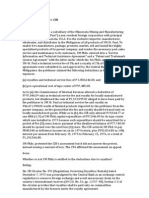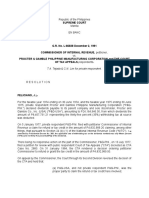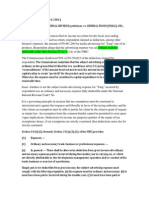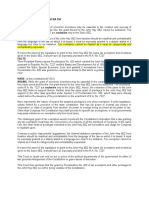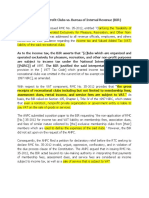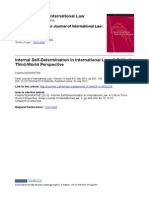Zamora v. Collector
Zamora v. Collector
Uploaded by
Pax YabutCopyright:
Available Formats
Zamora v. Collector
Zamora v. Collector
Uploaded by
Pax YabutOriginal Description:
Copyright
Available Formats
Share this document
Did you find this document useful?
Is this content inappropriate?
Copyright:
Available Formats
Zamora v. Collector
Zamora v. Collector
Uploaded by
Pax YabutCopyright:
Available Formats
MARIANO ZAMORA, petitioner,
vs.
COLLECTOR OF INTERNAL REVENUE and COURT OF TAX APPEALS,
respondents.G.R. No. L-15290, May 31, 1963
Paredes, J.:
Facts:
Mariano Zamora, owner of the Bay View Hotel and Farmacia Zamora, filed his
income tax returns. The CIR found that he failed to file his return of the capital
gains derived from the sale of certain real properties and claimed deductions
which were not allowable. The collector required him to pay deficiency income
tax. On appeal by Zamora, the CTA reduced the amount of deficiency income
tax.
Zamora appealed, alleging that the CTA erred in dissallowing P10,478.50, as
promotion expenses incurred by his wife for the promotion of the Bay View
Hotel and Farmacia Zamora (which is of P20,957.00, supposed business
expenses).
Zamora alleged that the CTA erred in disallowing P10,478.50 as promotion
expenses incurred by his wife for the promotion of the Bay View Hotel and
Farmacia Zamora. He contends that the whole amount of P20,957.00 as
promotion expenses, should be allowed and not merely one-half of it, on the
ground that, while not all the itemized expenses are supported by receipts, the
absence of some supporting receipts has been sufficiently and satisfactorily
established.
Issue:
Whether or not CTA erred in allowing only one half of the promotion expenses?
Ruling: NO.
Section 30, of the Tax Code, provides that in computing net income, there shall
be allowed as deductions all the ordinary and necessary expenses paid or
incurred during the taxable year, in carrying on any trade or business. Since
promotion expenses constitute one of the deductions in conducting a business,
same must satisfy these requirements. Claim for the deduction of promotion
expenses or entertainment expenses must also be substantiated or supported
by record showing in detail the amount and nature of the expenses incurred.
Considering, as heretofore stated, that the application of Mrs. Zamora for dollar
allocation shows that she went abroad on a combined medical and business
trip, not all of her expenses came under the category of ordinary and necessary
expenses; part thereof constituted her personal expenses. There having been
no means by which to ascertain which expense was incurred by her in
connection with the business of Mariano Zamora and which was incurred for
her personal benefit, the Collector and the CTA in their decisions, considered
50% of the said amount of P20,957.00 as business expenses and the other
50%, as her personal expenses. We hold that said allocation is very fair to
Mariano Zamora, there having been no receipt whatsoever, submitted to
explain the alleged business expenses, or proof of the connection which said
expenses had to the business or the reasonableness of the said amount of
P20,957.00.
In the case of Visayan Cebu Terminal Co., Inc. v. CIR., it was declared that
representation expenses fall under the category of business expenses
which are allowable deductions from gross income, if they meet the
conditions prescribed by law, particularly section 30 (a) [1], of the Tax
Code; that to be deductible, said business expenses must be ordinary and
necessary expenses paid or incurred in carrying on any trade or business;
that those expenses must also meet the further test of reasonableness in
amount. They should also be covered by supporting papers; in the absence
thereof the amount properly deductible as representation expenses should
be determined from available data.
You might also like
- Compliance ManifestationDocument2 pagesCompliance ManifestationNiño Anthony Silvestrece91% (11)
- CIR v. Fortune Tobacco Corporation, 559 SCRA 161 (2008)Document4 pagesCIR v. Fortune Tobacco Corporation, 559 SCRA 161 (2008)Happy Dreams Philippines0% (1)
- Domingo vs. Garlitos Case DigestDocument1 pageDomingo vs. Garlitos Case DigestAdhara CelerianNo ratings yet
- Sample of Memo For Preliminary InvestigationDocument2 pagesSample of Memo For Preliminary InvestigationDennis Saquing67% (3)
- FFL Wills 2011 1Document53 pagesFFL Wills 2011 1Alexandra MasriNo ratings yet
- Gutierrez Hermanos Vs Oria HermanosDocument4 pagesGutierrez Hermanos Vs Oria HermanosleawisokaNo ratings yet
- ME Holding Corp vs. CADocument2 pagesME Holding Corp vs. CAJeremae Ann CeriacoNo ratings yet
- CIR v. PAL DigestDocument2 pagesCIR v. PAL DigestSarah RosalesNo ratings yet
- 3M PhilippinesDocument2 pages3M PhilippinesKarl Vincent Raso100% (1)
- CIR v. AcesiteDocument2 pagesCIR v. AcesiteATRNo ratings yet
- Fisher v. Trinidad G.R. No. L-17518 October 30, 1922Document10 pagesFisher v. Trinidad G.R. No. L-17518 October 30, 1922aNo ratings yet
- Lutz v. AranetaDocument2 pagesLutz v. AranetaCates dela RosaNo ratings yet
- G.R. No. 211666, February 25, 2015 Republic of The Philippines, Represented by The Department of Public WORKS AND HIGHWAYS, Petitioners, v. ARLENE R. SORIANO, RespondentDocument1 pageG.R. No. 211666, February 25, 2015 Republic of The Philippines, Represented by The Department of Public WORKS AND HIGHWAYS, Petitioners, v. ARLENE R. SORIANO, RespondentKennethAnthonyMagdamitNo ratings yet
- Cir Vs Bank of Commerce DigestDocument1 pageCir Vs Bank of Commerce DigestMimmi ShaneNo ratings yet
- CIR v. Tours Specialist Inc.Document2 pagesCIR v. Tours Specialist Inc.Gyrsyl Jaisa GuerreroNo ratings yet
- CIR v. de La SalleDocument3 pagesCIR v. de La SalleGabriel AdoraNo ratings yet
- Philhealth Care vs. CIR, 554 SCRA 411Document22 pagesPhilhealth Care vs. CIR, 554 SCRA 411KidMonkey2299No ratings yet
- Steag State Power, Inc. v. Commissioner of Internal Revenue, G.R. No. 205282, January 14, 2019 (Third Division)Document1 pageSteag State Power, Inc. v. Commissioner of Internal Revenue, G.R. No. 205282, January 14, 2019 (Third Division)John Kenneth JacintoNo ratings yet
- G.R. No. L-19842 December 26, 1969 REPUBLIC OF THE PHILIPPINES, Plaintiff-Appellee, CENTRAL AZUCARERA DEL DANAO, Defendant-Appellant. FactsDocument8 pagesG.R. No. L-19842 December 26, 1969 REPUBLIC OF THE PHILIPPINES, Plaintiff-Appellee, CENTRAL AZUCARERA DEL DANAO, Defendant-Appellant. FactstwIzNo ratings yet
- Silkair Vs CirDocument2 pagesSilkair Vs CirNage Constantino100% (1)
- Commissioner of Internal Revenue V Solidbank CorporationDocument2 pagesCommissioner of Internal Revenue V Solidbank CorporationMarj CenNo ratings yet
- CIR v. CA and CDCP Mining CorpDocument3 pagesCIR v. CA and CDCP Mining CorpEva TrinidadNo ratings yet
- Republic v. Mambulao Lumber CompanyDocument2 pagesRepublic v. Mambulao Lumber Company8111 aaa 1118No ratings yet
- Systra Philippines vs. Cir G.R. No. 176290 September 21, 2007Document2 pagesSystra Philippines vs. Cir G.R. No. 176290 September 21, 2007Armstrong BosantogNo ratings yet
- 160 Scra 560 (GR L-66838) Cir vs. Procter and GambleDocument37 pages160 Scra 560 (GR L-66838) Cir vs. Procter and GambleRuel FernandezNo ratings yet
- Atlas Consolidated Mining & Dev. Corp. vs. Commissioner of Internal RevenueDocument20 pagesAtlas Consolidated Mining & Dev. Corp. vs. Commissioner of Internal RevenueKristel HipolitoNo ratings yet
- 3.G.R. No. 103092Document5 pages3.G.R. No. 103092Lord AumarNo ratings yet
- Commissioner of Internal Revenue vs. Wander PhilippinesDocument1 pageCommissioner of Internal Revenue vs. Wander PhilippinesmwaikeNo ratings yet
- CD - 81. Allied Banking v. Quezon CityDocument2 pagesCD - 81. Allied Banking v. Quezon CityCzarina CidNo ratings yet
- Icard v. City Council of Baguio - JamerDocument2 pagesIcard v. City Council of Baguio - JamerRenzo JamerNo ratings yet
- Infantry Post Exchange vs. Posadas, G.R. No. 33403, Sept. 4, 1930Document8 pagesInfantry Post Exchange vs. Posadas, G.R. No. 33403, Sept. 4, 1930KidMonkey2299100% (1)
- Cir Vs Tokyo ShippingDocument5 pagesCir Vs Tokyo ShippingIshmael SalisipNo ratings yet
- CM Hoskins V CIRDocument3 pagesCM Hoskins V CIRPaula Villarin100% (1)
- CIR Vs MarubeniDocument1 pageCIR Vs MarubeniMon DreykNo ratings yet
- British American Tobacco v. Camacho Case DigestDocument3 pagesBritish American Tobacco v. Camacho Case DigestMak Francisco100% (1)
- CIR V. Isabela Cultural Corp.: GR NO 172231 February 12, 2007Document2 pagesCIR V. Isabela Cultural Corp.: GR NO 172231 February 12, 2007Mary AnneNo ratings yet
- GR 160528 - CIR Vs PAL - Oct 9 2006Document1 pageGR 160528 - CIR Vs PAL - Oct 9 2006Mark Amistoso100% (1)
- CIR v. Vda de PrietoDocument3 pagesCIR v. Vda de Prietoevelyn b t.No ratings yet
- MCIAA Vs Marcos Case DigestDocument3 pagesMCIAA Vs Marcos Case DigestLuigi JaroNo ratings yet
- CIR Vs General Foods DigestDocument3 pagesCIR Vs General Foods DigestGil Aldrick FernandezNo ratings yet
- CIR Vs CA, CTA, and GCL Retirement Plan TAXDocument2 pagesCIR Vs CA, CTA, and GCL Retirement Plan TAXLemuel Angelo M. Eleccion100% (1)
- Team Sual Corp. v. CIR G.R. No. 201225 April 18, 2018Document6 pagesTeam Sual Corp. v. CIR G.R. No. 201225 April 18, 2018William SantosNo ratings yet
- Angeles Univ Foundation V City of AngelesDocument4 pagesAngeles Univ Foundation V City of AngelesjeyarelsiNo ratings yet
- United Cadiz Sugar Farmers Association Multi-Purpose Cooperative v. CommissionerDocument6 pagesUnited Cadiz Sugar Farmers Association Multi-Purpose Cooperative v. CommissionerEryl YuNo ratings yet
- CIR vs. FMF Development Corporation 167765Document1 pageCIR vs. FMF Development Corporation 167765magenNo ratings yet
- Garrison Vs Court of AppealsDocument11 pagesGarrison Vs Court of AppealsRoizki Edward MarquezNo ratings yet
- Doctrinal Digest:: Cir Vs Bpi G.R. No. 147375, June 26, 2006Document10 pagesDoctrinal Digest:: Cir Vs Bpi G.R. No. 147375, June 26, 2006JMANo ratings yet
- Victorias Milling Vs PpaDocument2 pagesVictorias Milling Vs PpaMike LlamasNo ratings yet
- Commissioner of Internal Revenue vs. MarubeniDocument1 pageCommissioner of Internal Revenue vs. Marubenimwaike100% (1)
- Nursery Care Corporation Vs Anthony Acevedo, GR No. 180651, July 30, 2014Document3 pagesNursery Care Corporation Vs Anthony Acevedo, GR No. 180651, July 30, 2014Diane DistritoNo ratings yet
- Silkair (Singapore) Pte, LTD vs. CirDocument2 pagesSilkair (Singapore) Pte, LTD vs. CirMarylou Macapagal100% (2)
- John Hay Sez v. Lim, 414 Scra 356Document1 pageJohn Hay Sez v. Lim, 414 Scra 356Scrib LawNo ratings yet
- TAX DigestDocument18 pagesTAX DigestBerna BadongenNo ratings yet
- Gancayco Vs CollectorDocument1 pageGancayco Vs CollectorDPMPascuaNo ratings yet
- ANPC vs. BIRDocument2 pagesANPC vs. BIRAnneNo ratings yet
- Cagayan Electric Power V CommissionerDocument1 pageCagayan Electric Power V CommissionerTon Ton Cananea100% (1)
- Repeat of "11. CIR v. CTA", All Issues and Decisions Have Been Discussed in This Digest So Just Reposting. Thank You Steph! 3Document3 pagesRepeat of "11. CIR v. CTA", All Issues and Decisions Have Been Discussed in This Digest So Just Reposting. Thank You Steph! 3Bryce King100% (1)
- Limpan Vs CIRDocument5 pagesLimpan Vs CIRBenedick LedesmaNo ratings yet
- British American Tobacco Vs Camacho 562 SCRA 511 DIGESTDocument8 pagesBritish American Tobacco Vs Camacho 562 SCRA 511 DIGESTMaica MahusayNo ratings yet
- Cir v. LancasterDocument2 pagesCir v. LancasterGlyza Kaye Zorilla PatiagNo ratings yet
- Zamora VDocument9 pagesZamora VJustine Jay Casas LopeNo ratings yet
- Zamora vs. Collector (1963) - Allowed Tax Deductions: FactsDocument23 pagesZamora vs. Collector (1963) - Allowed Tax Deductions: FactsHeberdon LitaNo ratings yet
- G.R. L-15290 - May 31, 1963: Cases Nos. L-15290 and L-15280Document2 pagesG.R. L-15290 - May 31, 1963: Cases Nos. L-15290 and L-15280Aila AmpNo ratings yet
- 79-Zamora v. CIR G.R. No. L-15290 May 31, 1963Document6 pages79-Zamora v. CIR G.R. No. L-15290 May 31, 1963Jopan SJNo ratings yet
- AOI SampleDocument10 pagesAOI SamplePax YabutNo ratings yet
- Anti Carnapping ActDocument5 pagesAnti Carnapping ActPax YabutNo ratings yet
- NTC V CA 1999Document2 pagesNTC V CA 1999Pax Yabut100% (1)
- Tax Evasion-Cir v. TodaDocument4 pagesTax Evasion-Cir v. TodaPax YabutNo ratings yet
- Insular Life Natu Vs Insular Assurance LTDDocument4 pagesInsular Life Natu Vs Insular Assurance LTDPax YabutNo ratings yet
- Remedial Law Digest PDFDocument9 pagesRemedial Law Digest PDFPax Yabut0% (1)
- Special Proceedings Cases Mixed Part 1 Numbers 1 To 20Document52 pagesSpecial Proceedings Cases Mixed Part 1 Numbers 1 To 20Pax YabutNo ratings yet
- Mock Finals - Consti1 - DanicaDocument4 pagesMock Finals - Consti1 - DanicaAnselmo Rodiel IVNo ratings yet
- Law Mantra: Case Comment On Sec. 106 of The Indian Evidence ActDocument4 pagesLaw Mantra: Case Comment On Sec. 106 of The Indian Evidence ActRohan VijayNo ratings yet
- (HC) Cooper v. State of California Et Al - Document No. 4Document2 pages(HC) Cooper v. State of California Et Al - Document No. 4Justia.comNo ratings yet
- Right To BailDocument6 pagesRight To Bailreese93100% (1)
- Contract of GuaranteeDocument21 pagesContract of GuaranteeShubangi GNo ratings yet
- PROFESSIONAL REGULATIONS COMMISSION VS. ARLENE DE GUZMAN, ET AL., June 21, 2004Document2 pagesPROFESSIONAL REGULATIONS COMMISSION VS. ARLENE DE GUZMAN, ET AL., June 21, 2004sahara lockwoodNo ratings yet
- Winding Up of A CompanyDocument6 pagesWinding Up of A CompanyRajat KaushikNo ratings yet
- TMDigital ContractDocument4 pagesTMDigital ContractPhil DubleyNo ratings yet
- US Vs VaguilarDocument3 pagesUS Vs VaguilarRichard BalaisNo ratings yet
- Legal Doctrines CompilationDocument30 pagesLegal Doctrines Compilationcode4saleNo ratings yet
- Serg's Product vs. PCI Leasing and Finance Corporation (GR No. 137705, August 22, 2000)Document4 pagesSerg's Product vs. PCI Leasing and Finance Corporation (GR No. 137705, August 22, 2000)Kimberly SendinNo ratings yet
- SK FAQsDocument88 pagesSK FAQsLindsey MarieNo ratings yet
- SH Satish Mehra Vs Delhi Administration Anr On 31 July 1996Document7 pagesSH Satish Mehra Vs Delhi Administration Anr On 31 July 1996Blade™ ®No ratings yet
- Treaty On The Functioning of The EUDocument2 pagesTreaty On The Functioning of The EUapi-248325932No ratings yet
- M-S.rishabh Agro Industries LTD Vs P.N.B. Capital Services LTD On 9 May, 2000Document7 pagesM-S.rishabh Agro Industries LTD Vs P.N.B. Capital Services LTD On 9 May, 2000sanjayankrNo ratings yet
- CHANNEL ACCREDITATION FORM NEW V.4 July 2021 COMPLIANCEDocument4 pagesCHANNEL ACCREDITATION FORM NEW V.4 July 2021 COMPLIANCEjeannsantos033No ratings yet
- GR 10 Viva Questions On Consumer AwarnessDocument3 pagesGR 10 Viva Questions On Consumer Awarnesssatwik Chakraborty100% (4)
- Commission On Elections, Rommel Arnado y Cagoco, Linog G. BaluaDocument45 pagesCommission On Elections, Rommel Arnado y Cagoco, Linog G. BaluaOnnie LeeNo ratings yet
- Minimum Wage Act PowerPointDocument9 pagesMinimum Wage Act PowerPointMarilyn SinghNo ratings yet
- Rule6 of Cenvat CR - Rules, 2004Document2 pagesRule6 of Cenvat CR - Rules, 2004Shahed KinariwalaNo ratings yet
- People v. Daniel (IGNACIO)Document1 pagePeople v. Daniel (IGNACIO)Christian IgnacioNo ratings yet
- Harry Go Vs PeopleDocument3 pagesHarry Go Vs Peoplecarinokatrina0% (1)
- Example of Lease ContractDocument3 pagesExample of Lease ContractAthena Louisse AbellaNo ratings yet
- CCDCOE Tallinn Manual Onepager WebDocument2 pagesCCDCOE Tallinn Manual Onepager WebHulk BalboaNo ratings yet
- UP Board of Regents v. CA and Arokiaswamy William Margaret Celine, G.R. No. 134625, August 31, 1999 PDFDocument10 pagesUP Board of Regents v. CA and Arokiaswamy William Margaret Celine, G.R. No. 134625, August 31, 1999 PDFEdgar Joshua TimbangNo ratings yet
- Internal Self-Determination in International Law A Critical Third-World PerspectiveDocument36 pagesInternal Self-Determination in International Law A Critical Third-World PerspectiveHimanshu ChauhanNo ratings yet
- A Study On The Regulation of Contract Labour in India: 6.5labour and Industrial LawDocument22 pagesA Study On The Regulation of Contract Labour in India: 6.5labour and Industrial LawUditanshu Misra100% (1)








